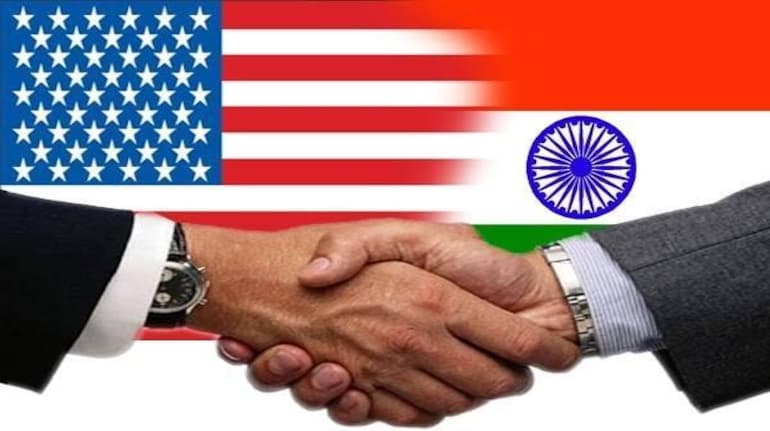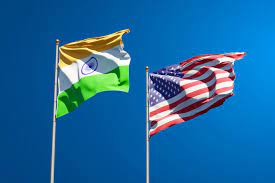In a remarkable display of their commitment to advancing strategic technology partnerships and defense industrial cooperation, President Joe Biden and Prime Minister Narendra Modi of India announced the groundbreaking US-India initiative on Critical and Emerging Technologies (iCET) in May of last year. This collaborative effort has since been thriving, culminating in the historic inaugural meeting of the India-US Strategic Trade Dialogue (IUSSTD) held in Washington D.C. on Tuesday. The dialogue marked a significant milestone in the bilateral relationship, with both nations keen on propelling strategic technology and trade collaborations envisioned under the iCET initiative.
Bilateral Collaboration: US and India Forge Strong Partnership through iCET Initiative
Foreign Secretary Vinay Mohan Kwatra led the Indian delegation with great enthusiasm and active participation during the dialogue. The US delegation, co-led by Alan Estevez, Under Secretary for Industry and Security in the US Department of Commerce, and Ambassador Victoria Nuland, Under Secretary of State for Political Affairs in the US Department of State, warmly welcomed the Indian representatives.
Ambassador Nuland expressed her gratitude to Kwatra and the Indian delegation for their valuable contributions to the first US-India Strategic Trade Dialogue, highlighting the shared objective of growing economies and creating jobs through enhanced bilateral trade and high-tech collaboration.
The IUSSTD meeting focused on identifying avenues to facilitate the development and trade of critical technologies across various domains, including semiconductors, space, telecommunications, quantum computing, artificial intelligence, defense, and biotechnology, among others. In-depth reviews of relevant bilateral export control regulations took place, aiming to establish resilient and diversified supply chains for these strategic technologies. Emphasizing the importance of global collaboration, the participants also explored ongoing cooperation in multilateral export control regimes, reaching a consensus to exchange best practices. Furthermore, they agreed to organize workshops and similar activities to enhance awareness among industry professionals, academia, and other stakeholders about the export control regimes.
Recognizing the pivotal role of co-production, co-development, and robust industrial collaborations in critical technologies, both sides mutually agreed to establish a regular monitoring group. This group will be tasked with reviewing progress and deepening cooperation in bilateral high-tech trade and technology partnerships, fostering a stronger and more comprehensive global strategic partnership between India and the United States.
The inaugural meeting of the IUSSTD not only showcased the shared determination of both nations but also solidified their bond as crucial global allies. By harnessing their respective strengths in critical and emerging technologies, India and the United States have set a precedent for fruitful collaboration. The success of the iCET initiative and the IUSSTD meeting underscores their commitment to innovation, economic growth, and job creation, elevating their bilateral relationship to new heights.
As the world witnesses the unfolding of this dynamic trade partnership, the future holds immense potential for groundbreaking advancements in critical technologies. India and the United States are poised to become trailblazers in this realm, leveraging their collective knowledge, expertise, and resources. Together, they will shape the technological landscape, address global challenges, and unlock new avenues for prosperity.
Bilateral Collaboration: US and India Forge Strong Partnership through iCET Initiative

The iCET initiative serves as a testament to the power of collaboration, paving the way for a brighter, more interconnected future. As India and the United States forge ahead, their shared vision and unwavering commitment to innovation will continue to drive transformative change, benefiting not only their own nations but also the world at large.
The iCET initiative, announced by President Biden and Prime Minister Modi in May of the previous year, represents a significant step towards strengthening the ties between India and the United States. It aims to elevate the strategic technology partnership and defense industrial cooperation between the two nations to unprecedented heights. Since its inception, the iCET initiative has paved the way for robust engagement and collaboration in various sectors, igniting the spark of innovation and progress.
The inaugural meeting of the India-US Strategic Trade Dialogue (IUSSTD), held in Washington D.C., was a momentous occasion that underscored the shared commitment of both nations to advancing their economic and technological frontiers. Led by Foreign Secretary Vinay Mohan Kwatra and co-led by Alan Estevez, Under Secretary for Industry and Security in the US Department of Commerce, and Ambassador Victoria Nuland, Under Secretary of State for Political Affairs in the US Department of State, the dialogue set the stage for an enriching exchange of ideas, strategies, and possibilities.
The participants of the dialogue focused their discussions on identifying avenues for facilitating the development and trade of critical technologies across a wide range of domains. The areas of interest included semiconductors, space exploration, telecommunications, quantum computing, artificial intelligence, defense technologies, biotechnology, and many others. By delving into comprehensive reviews of bilateral export control regulations, both nations aimed to establish resilient and diversified supply chains for these strategic technologies. Through their joint efforts, they sought to create an ecosystem that fosters innovation, growth, and cooperation.
Moreover, the participants recognized the significance of global collaboration in shaping the future of critical technologies. In this context, they examined ongoing cooperation in multilateral export control regimes, emphasizing the need to exchange best practices. The goal was to leverage the collective wisdom of nations and harness the power of collaboration to address common challenges and achieve shared goals. Workshops and similar activities were deemed essential to enhance awareness among industry professionals, academia, and other stakeholders about the export control regimes, fostering a culture of transparency and knowledge sharing.

